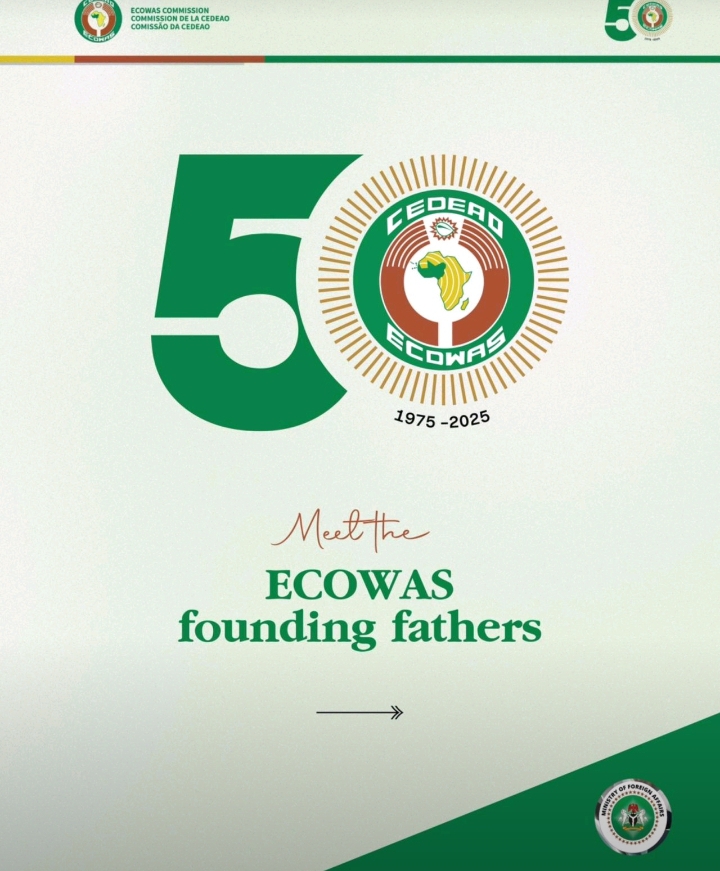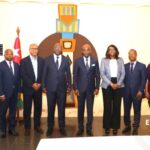ECOWAS@50: Assessing Insecurity, Governance, Regional Integration, and Institutional Commitment in West Africa.
By Raymond Enoch.
At the heart of the golden jubilee of the Economic Community of West African States (ECOWAS) lays a contemporary need, a deep unease shadows of the celebrations. Founded on May 28, 1975, with the vision of promoting regional economic integration, collective security, and democratic governance, ECOWAS today finds itself tall under immense pressure to redefine its role amid mounting insecurity, political instability, and widening economic variables of its citizens.

Fifty years on, the West African institution is caught in a storm of jihadist violence, climate change, unconstitutional power grabs among heads of states and government and the defection of key member states. These developments have put out the cracks in the regional bloc’s foundational structure and raised a crucial question: Can ECOWAS evolve fast enough to remain strategic, institutional relevance in a rapidly changing regional order? Yes it can and its possible.
In his opening remarks during the 50th anniversary summit held in Lagos, ECOWAS Commission President Dr. Omar Alieu Touray warned of the dire security challenges facing the region. “We are confronting the greatest challenges we face today: terrorism, climate change, unconstitutional change of government, poverty and economic disparities,” he said. His words underscored the deepening fragility of the region’s political and security landscape.
Jihadist violence in 2025 has reached alarming new heights, particularly in the Sahel states of Burkina Faso, Mali, and Niger — all of which have now withdrawn from ECOWAS following a series of military coups and the bloc’s subsequent sanctions. These nations, once founding members of ECOWAS, have since formed their own Alliance of Sahel States, signaling not just a political break out but a dramatic realignment of regional power in the real sense of the word, though experts and policy makers in the region still express optimism of a possible mending of fences.
“If you don’t have security, then of course it means that you cannot guarantee a robust economy in the region,” observed Beverly Ochieng, a senior analyst at Control Risk based in Dakar. Her statement reflects a broader regional anxiety: without peace and stability, the goal of economic integration becomes not only unfeasible but farcical.
Analysts have argued that, what is compounding the problem of ECOWAS is its failure to confront creeping authoritarianism within its ranks. Many observers point to Togo, where President Faure Gnassingbé was recently granted the powerful position of President of the Council of Ministers with no term limits — a move widely seen as a “constitutional coup.”
“This silence by ECOWAS when incumbents manipulate constitutions to prolong their grip on power sends a dangerous signal,” said a regional political scientist speaking under anonymity. “It undermines the bloc’s democratic legitimacy and encourages militaries to step in as so-called saviors.”
Indeed, this pattern of muted responses to civilian leaders undermining democratic institutions stands in stark contrast to the bloc’s swift punitive measures against military juntas. Critics argue that ECOWAS has applied seemingly a double standard, punishing overt coups but tolerating ‘constitutional coups’ that violate the spirit of democracy in West Africa.
Beyond governance, the bloc is also contending with the economic and humanitarian fallout from climate change. The intensifying desertification of the Sahel, coupled with resource scarcity and displacements, has fueled migration pressures, food insecurity, and conflict over land and water.
“These are not isolated issues,” said Dr. Adeola Adebayo, an expert in regional development at the University of Ibadan. “Climate-driven instability feeds into terrorism, which in turn undermines cross-border trade, weakens institutions, and corrodes trust in multilateral bodies like ECOWAS.”
The bloc’s original promise of economic upliftment now seems out of reach for many citizens. Inequality persists, trade barriers remain, and infrastructure gaps continue to hinder regional integration. These are possible issues that herald the next chapter of the ECOWAS as it evolves.
As ECOWAS turns 50, its future rests on its ability to continue to gain legitimacy, restore security, and reform its governance mechanisms. Analysts suggest a comprehensive overhaul is needed — one that not only rethinks how the bloc enforces democratic norms but also how it mediates conflicts and fosters sustainable development.
“The time for rhetoric is over,” said Touray. “We must act to preserve the unity, sovereignty, and prosperity of the West African people.”
Yet actions must speak louder than words. Observers are calling for greater civil society inclusion in ECOWAS decision-making, stronger institutional checks on presidential term extensions, and a renewed commitment to regional security cooperation.
Fifty years after its creation, ECOWAS stands at a pivotal juncture. The dream of a unified, prosperous, and democratic West Africa is under siege — not just from jihadists and coup plotters, but from within, through institutional inertia and selective accountability.
The question now is not merely whether ECOWAS can survive, but whether it can transform into a truly effective and inclusive body that reflects the aspirations of its people.
As West Africa looks toward its future, ECOWAS must decide: will it be a bulwark against disintegration, or a relic of integration lost?









